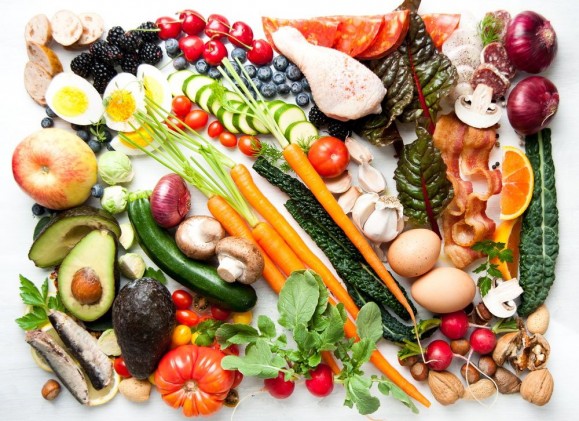You may feel like suddenly everyone you know is talking about the Paleo diet. So what are my thoughts?
Things I LIKE about the Paleo Diet:
1. Only eat whole foods: Automatically people are likely to feel better and lose weight
2. Focus on fresh vegetables and fruits: Focusing on eating so many vegetables and (low-glycemic) fruits is going to give you fiber, antioxidants, and phytonutrients
3. Nuts and seeds: Great source of protein and fats as well as many nutrients
4. No dairy, wheat, corn or soy: These are common allergens for many people, so avoiding these will definitely help some people. Plus, much of the corn and soy out there is genetically modified.
5. No processed foods like refined sugar, refined fats, trans fat, or processed meats: Most people in the nutrition field agree that these cause inflammation and weight gain. Everyone benefits from eliminating these.
6. Some people really benefit from a low/no grain, no legume, high animal-protein eating plan. These kinds of special eating plans are for very specific health reasons and should be done under the care of a professional.
Things I QUESTION about the Paleo Diet:
1. The supporters need to emphasize eating grass fed, organic meats or wild game, otherwise it is not “paleolithic” in any way since our commercial meat does not even resemble meat from even 100 years ago, let alone 20,000 years ago. I recommend that anyone eating meat or eggs try to buy mostly grass fed, organic products. They are more expensive but you really do get what you pay for.
I also have a lot of concerns about eating so much meat, beyond nutrition. There are also MAJOR environmental and ethical issues to consider as well. Eating so much meat requires using scarce resources like water and land to feed and support the animals; run-off from animal waste is a leading source of water pollution and causes “die-offs” in our oceans; animal agriculture is one of the leading causes of rainforest destruction; most people are eating meat from CAFOs, or Concentrated Animal Feeding Operations, otherwise known as factory farms, which are very dangerous and unhealthy places not only for the animals, but also for the people who work there; animal agriculture in the United States is directly linked to GMO crops like corn and soy grown as feed for the animals; over 15-17 million pounds of antibiotics are given to livestock every year to promote faster growth and address infections from their unsanitary living conditions. I could go on, but you get the picture. I do believe that some people need to eat animal meat for their health; however, we do need to remember it comes with a cost.
2. The ban on legumes and whole non-gluten grains across the board is troubling because some people do very well on these foods and they provide a great source of fiber, proteins, and nutrients. For many people, sprouting or soaking these foods can help aid digestion and absorption.
3. Is it a sustainable diet? To me this is the biggest issue. It is quite strict and restricting and most people will not maintain this way of eating for life. The creator of the diet, Loren Cordain, says you only need to eat Paleo 80% of the time. From my education and expertise, I also recommend the 80/20 goal where 80% of your foods are nourishing and that means your body can handle the 20% that is depleting. However, what is considered “nourishing” is much greater and wider. I question anything that is a “diet” and anything that cannot be maintained, otherwise it leads to more yo-yo dieting and weight gain for many people.
4. Not everyone is the same and I question whether paleo addresses biochemical individuality. Chris Kresser, a proponent of the paleo eating plan, has new book called Your Personal Paleo Code that seems to allow for flexibility as well as personalization. He also addresses non-food aspects of health, which acknowledges the holistic approach to health. I think Chris Kresser’s approach may address some of my main questions with many of the other paleo diets out there.
Ultimately, I think eating a whole foods eating plan—full of organic, fresh, seasonal produce, quality proteins and healthy fats—is the way to go. The details within that guideline (gluten, dairy, legumes, meat, soy, citrus, etc.) are going to vary person to person and will likely even change for us over the course of our lifetimes. The key is being open to experimentation and recognizing what works best for you right now.
Not sure what that looks like or need some support? Be sure to contact me today to schedule a free health history consultation!


I agree, Michelle! Paleo is great for the reasons you mentioned, but people need to be sure the meats are good-quality, grass-fed, organic – not from CAFOs! Also, some people really do need the legumes and some grains, but they should be soaked and maybe sprouted, like you said! Ultimately eating has to be sensible, sustainable, and enjoyable too.
Well said Robin, especially about food being ENJOYABLE too! 🙂